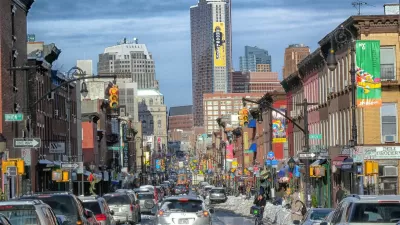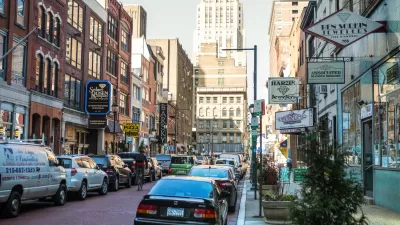Ongoing research from the University of California Transportation Center documents the detrimental effects that free street parking for the disabled has on city coffers and performance pricing systems. Is it time to reconsider such laws.
"There is no good way to ask this without sounding like a jerk, but here it is: Do disabled people really need free parking?" asks Emily Badger. "Yes, they need convenient parking spaces. But cities all over the country have oddly conflated drivers in need of close curbside access with people too poor to pay for it. The two groups are not necessarily one and the same. Worse, free parking for the disabled invites all kinds of wildly offensive misuse. As a result, the policy is arguably bad for urban parking systems, definitely bad for city coffers, even bad for the environment."
"The best evidence we've seen for this politically touchy case comes from some fascinating ongoing research out of the University of California Transportation Center, by Michael Manville and Jonathan Williams." Badger examines the findings reported in an article published by the two in ACCESS, the transportation center's magazine.
"Manville and Williams aren't arguing that we should abolish disabled parking all together. Rather, they argue that there's no good reason to make it free, and plenty of reasons not to."
FULL STORY: Seriously, We Have to Stop Giving Away Free Parking to the Disabled

Study: Maui’s Plan to Convert Vacation Rentals to Long-Term Housing Could Cause Nearly $1 Billion Economic Loss
The plan would reduce visitor accommodation by 25,% resulting in 1,900 jobs lost.

North Texas Transit Leaders Tout Benefits of TOD for Growing Region
At a summit focused on transit-oriented development, policymakers discussed how North Texas’ expanded light rail system can serve as a tool for economic growth.

Why Should We Subsidize Public Transportation?
Many public transit agencies face financial stress due to rising costs, declining fare revenue, and declining subsidies. Transit advocates must provide a strong business case for increasing public transit funding.

How to Make US Trains Faster
Changes to boarding platforms and a switch to electric trains could improve U.S. passenger rail service without the added cost of high-speed rail.

Columbia’s Revitalized ‘Loop’ Is a Hub for Local Entrepreneurs
A focus on small businesses is helping a commercial corridor in Columbia, Missouri thrive.

Invasive Insect Threatens Minnesota’s Ash Forests
The Emerald Ash Borer is a rapidly spreading invasive pest threatening Minnesota’s ash trees, and homeowners are encouraged to plant diverse replacement species, avoid moving ash firewood, and monitor for signs of infestation.
Urban Design for Planners 1: Software Tools
This six-course series explores essential urban design concepts using open source software and equips planners with the tools they need to participate fully in the urban design process.
Planning for Universal Design
Learn the tools for implementing Universal Design in planning regulations.
City of Santa Clarita
Ascent Environmental
Institute for Housing and Urban Development Studies (IHS)
City of Grandview
Harvard GSD Executive Education
Toledo-Lucas County Plan Commissions
Salt Lake City
NYU Wagner Graduate School of Public Service





























